Vietnam has a no-nonsense approach to Covid-19. Security guards don’t need to ask customers twice to wear a mask, and the wrong cough could see a house, street or city in lockdown.
But as doors shut, some are being left out in the blazing heat without a job, home or government funding to turn to. Concerns are growing for the capital’s homeless and near-homeless as those already living on the poverty line slip further down and newcomers from rural Vietnam, mostly youth looking for work amid a pandemic-dampened society, find a city with little to welcome them.
Looming fears of a second lockdown in Hanoi, and a recent closure of the informal hawking that normally sustains a meagre living for the urban poor, are only making it worse for the swelling population living on the margins of society.
“A lot of families are stressed,” said Vi Do, head the street outreach programme at Blue Dragon, a non-governmental organisation based in Hanoi that cares for youth and at-risk families around Vietnam. “They don’t know how they’re going to feed their kids.”
On a recent outreach mission, Do found himself barrelling across the city in rain gushing like a tap that won’t turn off. It was a typical August night in the capital city, and he was searching for a child sleeping under a bridge to shelter from the deluge.
Blue Dragon usually helps about 100 minors a year. But this year, by early August, that number had already hit 118, suggesting a doubling in total need on the street.
“We’re expecting to see numbers growing the same month-on-month,” Do said. “We’re talking about kids out on the street by themselves.”
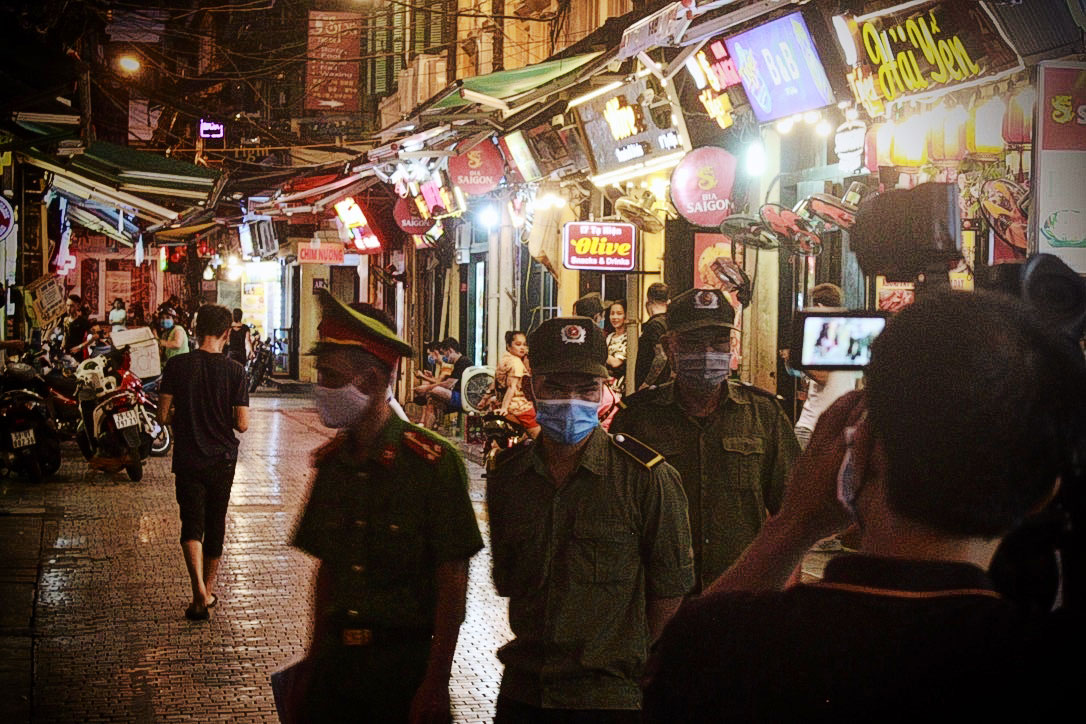
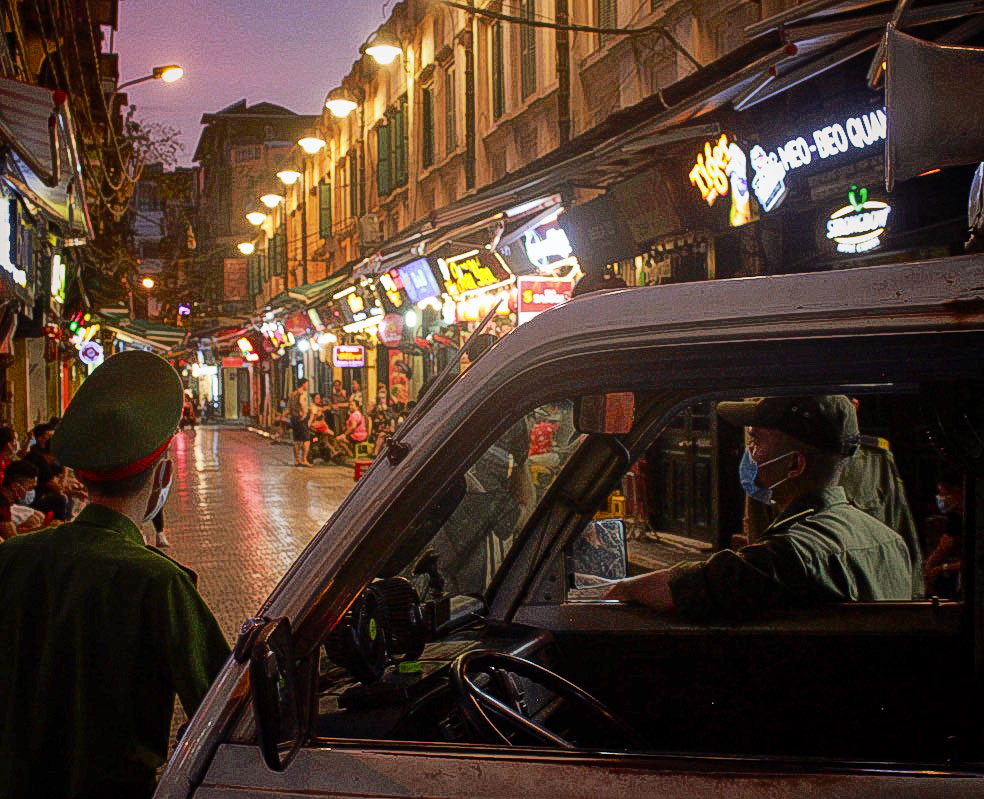
By 1 May, while countries around the world were still scrambling to make concrete decisions on the pandemic, Vietnam had just 270 Covid-19 cases and no deaths – a condition largely credited to its strict and rapid public health response to an initial outbreak. As a country bordering China, this made Vietnam the poster child of the WHO.
But, as cases began to rise sharply and spread out of the coastal city of Danang towards the end of July, the nation marked its first death from the disease caused by the novel coronavirus. Now, just a month later, 29 people have died from the virus and fears of a so-called second wave are spreading.
This apprehension, and the public health response launched to stanch the virus, may help to curb the outbreak. But the response has made life harder for Hanoi’s homeless and near-homeless, and the public aid intended to help families weather the economic effects of Covid-19 may not reach many who make their livelihood on the street.
That includes Hanoians like Lanh, a woman currently living rough in the capital. Though she’s a little older than the youths Do usually encounters, she and her child receive food and monetary aid from Blue Dragon.
People are scared of the pandemic as it’s the second wave. No one’s out on the streets, there’s no one to buy from me
On a recent day, she met with a Globe reporter beside a green tarpaulin sack stretched to the point of tearing – a behemoth of a bag, full of recyclable rubbish that towered over her three-year-old son. It represented two days worth of bottle and can collection around Hoan Kiem Lake, a spot usually known for its hordes of tourists. For this arduous work she received about 20,000VND, roughly $0.85 and a fraction of the rent due at the apartment she’d left when her income evaporated earlier this year.
She used to sell floral tasting teas on red or blue ‘tra da’ stands or flogging fruit when she could get it. When tourists were still here, she’d sell them souvenirs. But since Vietnam banned so-called street jobs on 1 August under a public health rationale, collecting recycled rubbish is all the work Lanh can get.
“Even if I wanted to discreetly sell it on the side I couldn’t,” Lanh explained. “People are scared of the pandemic as it’s the second wave. No one’s out on the streets, there’s no one to buy from me.”
Unfortunately, there’s nothing rare or distinct about Lanh’s employment struggles this year. The pandemic has hit every country hard, and while Vietnam managed to eke out gross domestic product (GDP) growth of 0.4% in the second quarter of this year, the previously booming economy is marking its worst performance in more than 35 years.
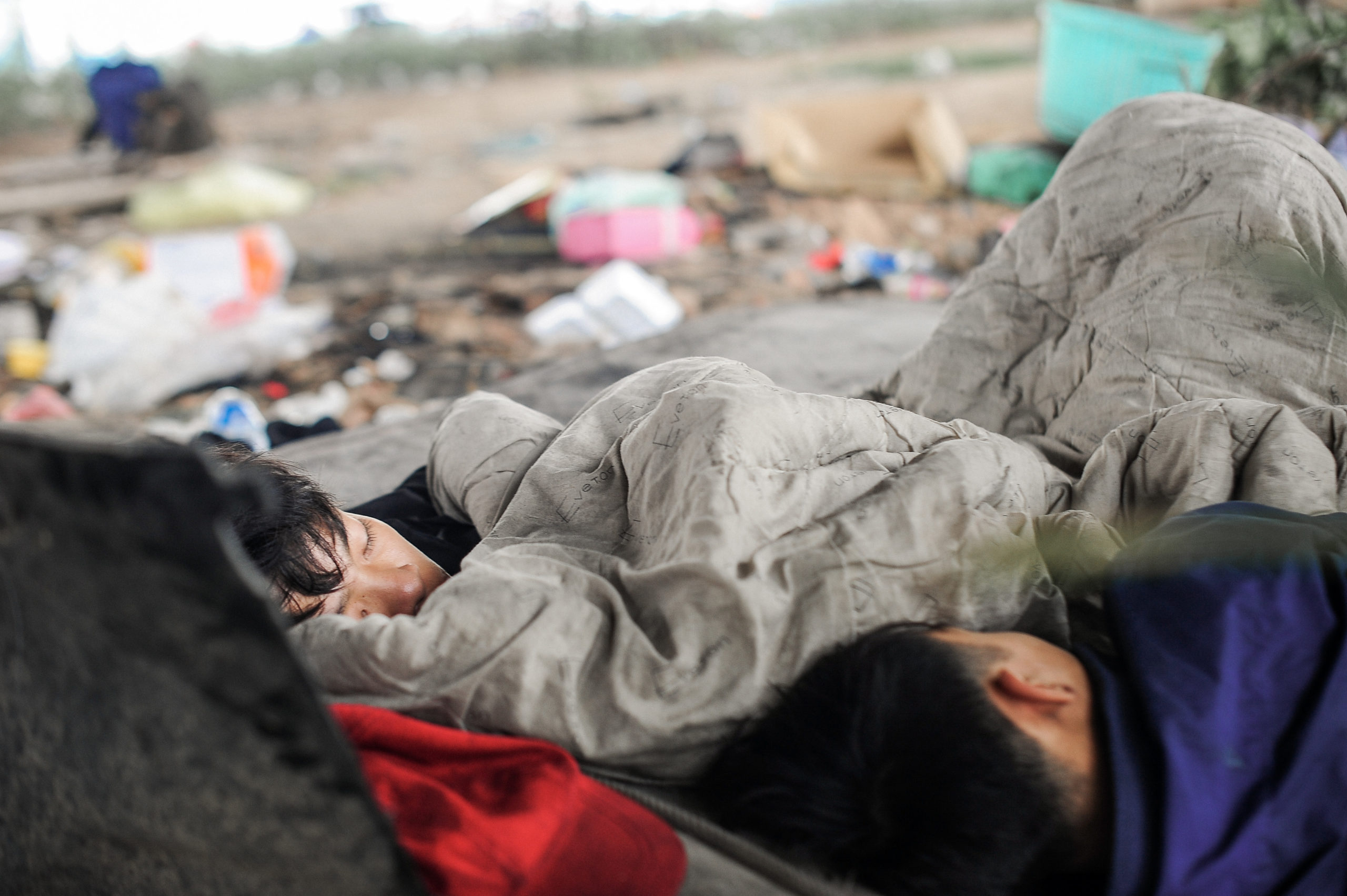
I asked to sign up to get the money, and they told me I would have had to have registered three months before the lockdown happened
That has directly affected the prospects of individuals. Unicef reported that, by mid-June, the number of people receiving unemployment allowance went up by 30% compared to last year. Hanoi fielded nearly 11,700 unemployment applications in May alone.
In early April the government set out a Covid-19 support package of roughly $2.6 billion aimed at protecting poor and nearly poor households. But fewer people than expected have actually seen this money, leaving many to scramble to plug holes in the household budget. For unregistered citizens, there can be a vanishingly small chance of receiving help from the state.
“The government hasn’t done anything to support homeless people,” Lanh said, tightly clutching a facemask-cum-handkerchief. Her fingernails are painted glittery hot pink, chipped down around the sides from living rough.
Despite living her whole life in Hanoi, mostly on its streets, Lanh isn’t registered with the local government, a process that creates eligibility to receive public services but depends on having an official address.
“My family was already poor when I was born,” Lanh said, describing the turbulence that has kept her off the government rolls. “At about six or seven I had to go out on the street selling gum.”
“When I went to the local support centre I was told that I wasn’t registered in Hanoi, so I couldn’t receive any benefits. I asked to sign up to get the money, and they told me I would have had to have registered three months before the lockdown happened.”
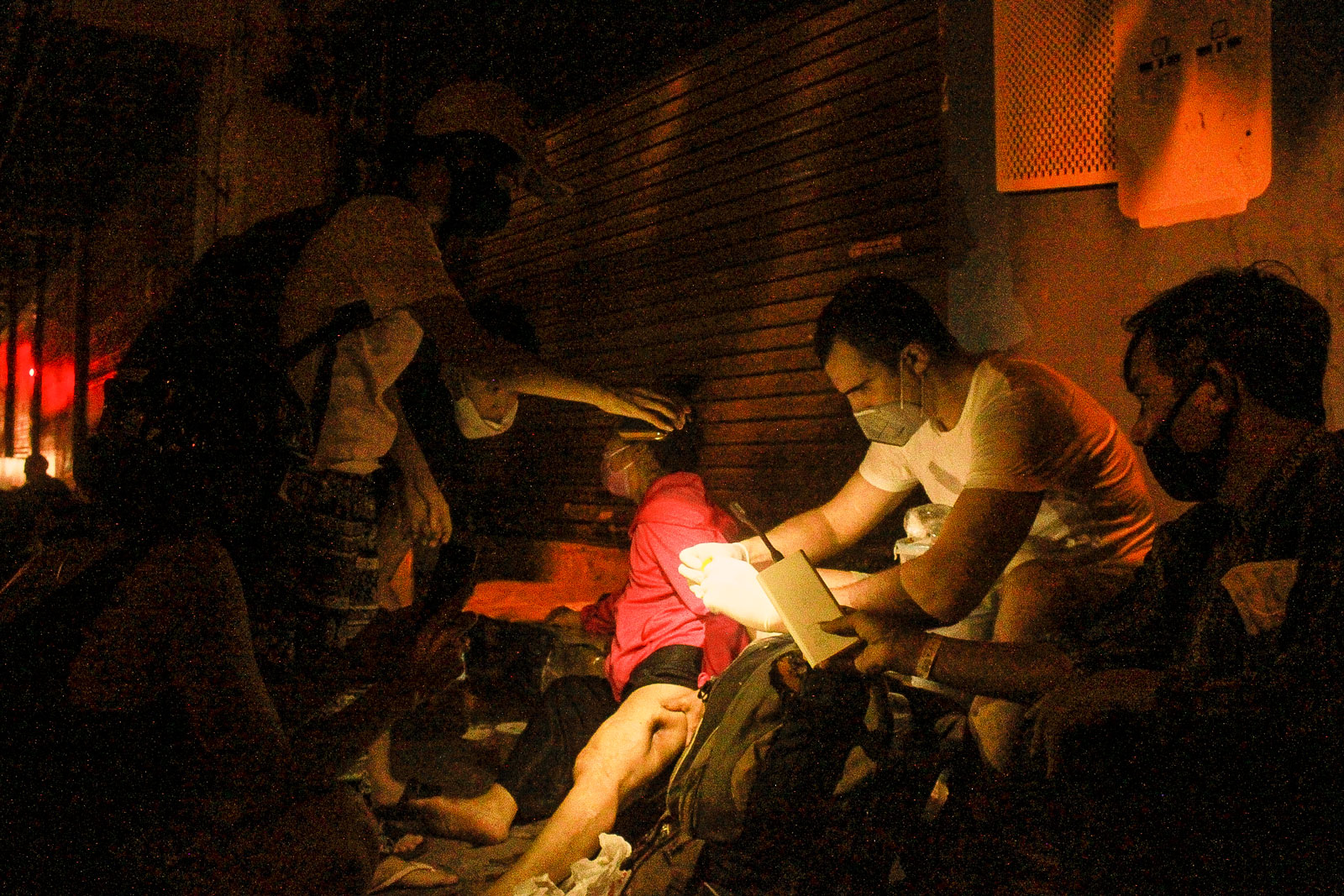
When 10pm rolls around, Hanoi’s hustle begins to slow. Small groups of the city’s homeless people begin congregating in several set spots around the city. They’re young and old to both extremes, villages of teenage runaways and elderly men and women.
They’re here because it’s a Thursday, and they know a team made up of foreigners and locals will soon come around to hand out food and treat their wounds.
Chris Axe is the founder of Help Hanoi’s Homeless (HHH) and he runs his crew of expat and Vietnamese volunteers with military-tight precision. He lays out the rules of the run with his hands lowered and clasped in front of him, like a humble politician.
“Get down to their level and make eye contact. If you’re tall it can be intimidating to stand over them,” Axe explained, himself a good couple of feet taller than most of the people he helps.
Axe drives an automatic motorbike with a lot of room in the footwell and under the seat. It’s heavy with food and medical supplies, stopping briefly at traffic lights, spluttering, then breathing out a heavy sigh of dark engine fumes, and carrying on to the next destination.
“We used to get about two or three people here before, but since the lockdown the numbers have shot up,” Axe explained, chatting on a broad empty road where 18 people stretched along one long shadowy step – the third of seven stops his team made that night.
Volunteers like those of HHH have made up a key piece of the makeshift safety net extended to people who make their beds in the quiet nooks of the street, a fluid population that now, in all appearances, seems to be rising amidst pandemic conditions.
But even though the dramatic increase in demands for service show a clear trend, those involved in advocacy for the homeless say it would be near impossible to estimate the city’s total population of unhoused people. That’s partly because it’s not always easy to track down these vulnerable individuals, especially if they don’t want to be found – or if others are invested in keeping them hidden.
For the past 11 years, Do from Blue Dragon has been trying to help homeless children get off the street and find shelter. That means finding solutions for their health and education in addition to the more dramatic need to save them from pimps, paedophiles and gangsters.
These kids are nearly always from rural areas, Do said, almost never from Hanoi itself.
Now, with Covid-19 stalling the economy and stifling education, the youth are coming to the capital from rural towns and villages, mostly looking for work. Their schools have closed, their parents have lost jobs and, fleeing the strain, many are now finding there is no Hanoi dream waiting for them when they step off the bus on a one-way ticket.
“They’d spent the money they saved coming here, and don’t know how to get home. They get stuck here,” Do explained.
As with Lanh, these kids are struggling to find a source of income. To the best of his knowledge, Do said not a single person that Blue Dragon works with has received aid from the government’s benefit scheme.
Some of the youth living rough manage to scrounge enough money to sleep in an all-hours internet cafe and occasionally bring their few clothes to a laundromat. Do said other kids, driven by hunger, find a tougher, more illicit existence.
“That hunger might drive them to crime,” he cautioned. “That’s what we’ve seen over the last few months, kids that we help have gone to prison for theft.”
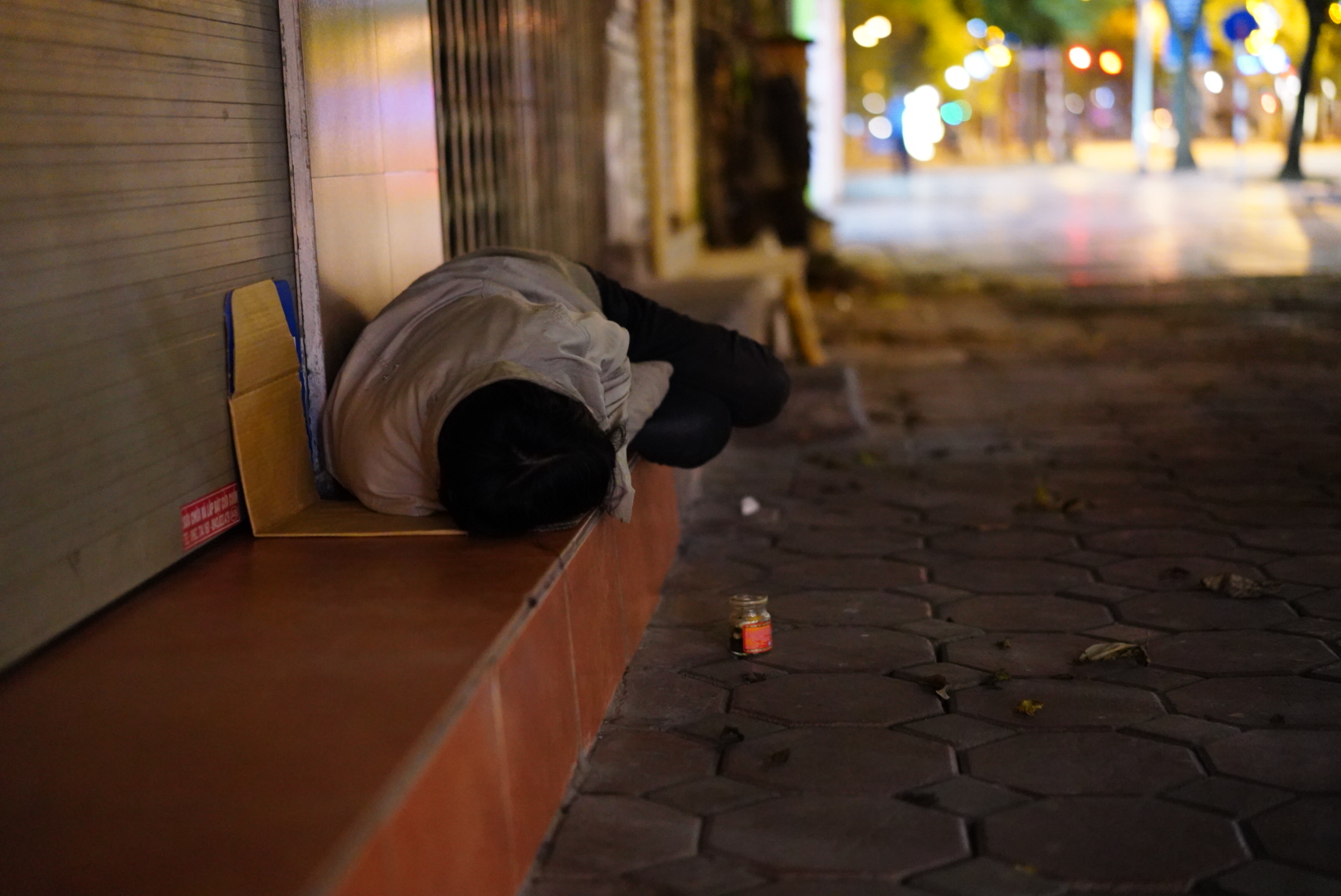
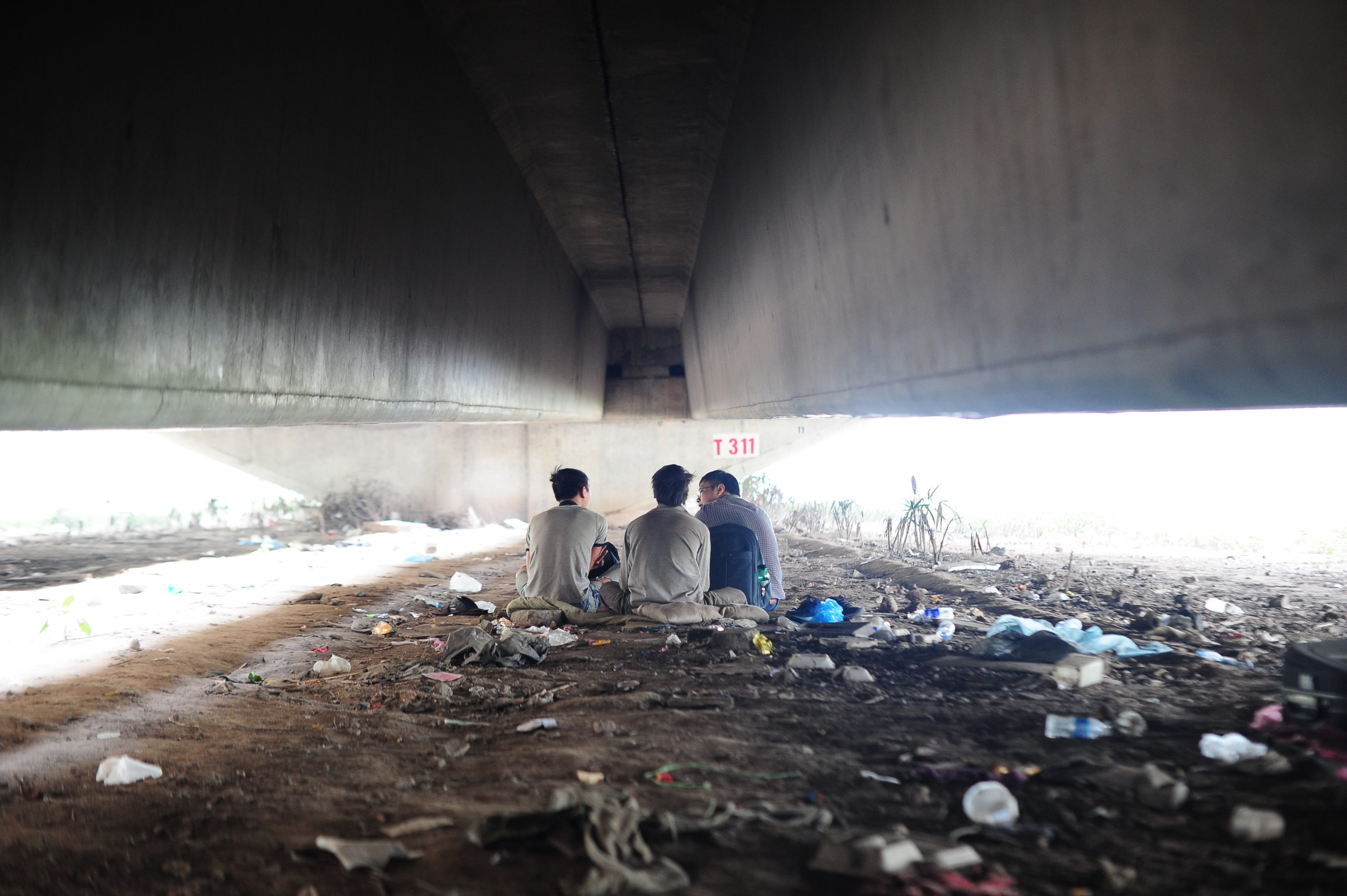
On another night, on a different street, Axe’s group finished handing out the bananas, rice and masks and moved on to a new task.
Axe called for a torch and put on medical gloves to attend to a woman simply called, for the sake of anonymity, by the name Ba – a respectful Vietnamese title for a grandmother.
Ba is 69, but appears much older and worryingly frail for a woman living on the streets. She’s in similar condition as many of the people on this strip. Axe explains the most vulnerable gather together for protection.
Ba was disoriented and couldn’t remember exactly what happened to her leg. What she can remember is spending all of her money at the hospital getting it looked at the first time around.
“I can’t afford to go back,” she said.
Axe explained that patching up Ba’s leg, which he believes to be a lingering wound from a big bug bite, has become a weekly job.
“It would be gone in a week if she could properly take care of it,” he said. “We’re just keeping it at bay.”
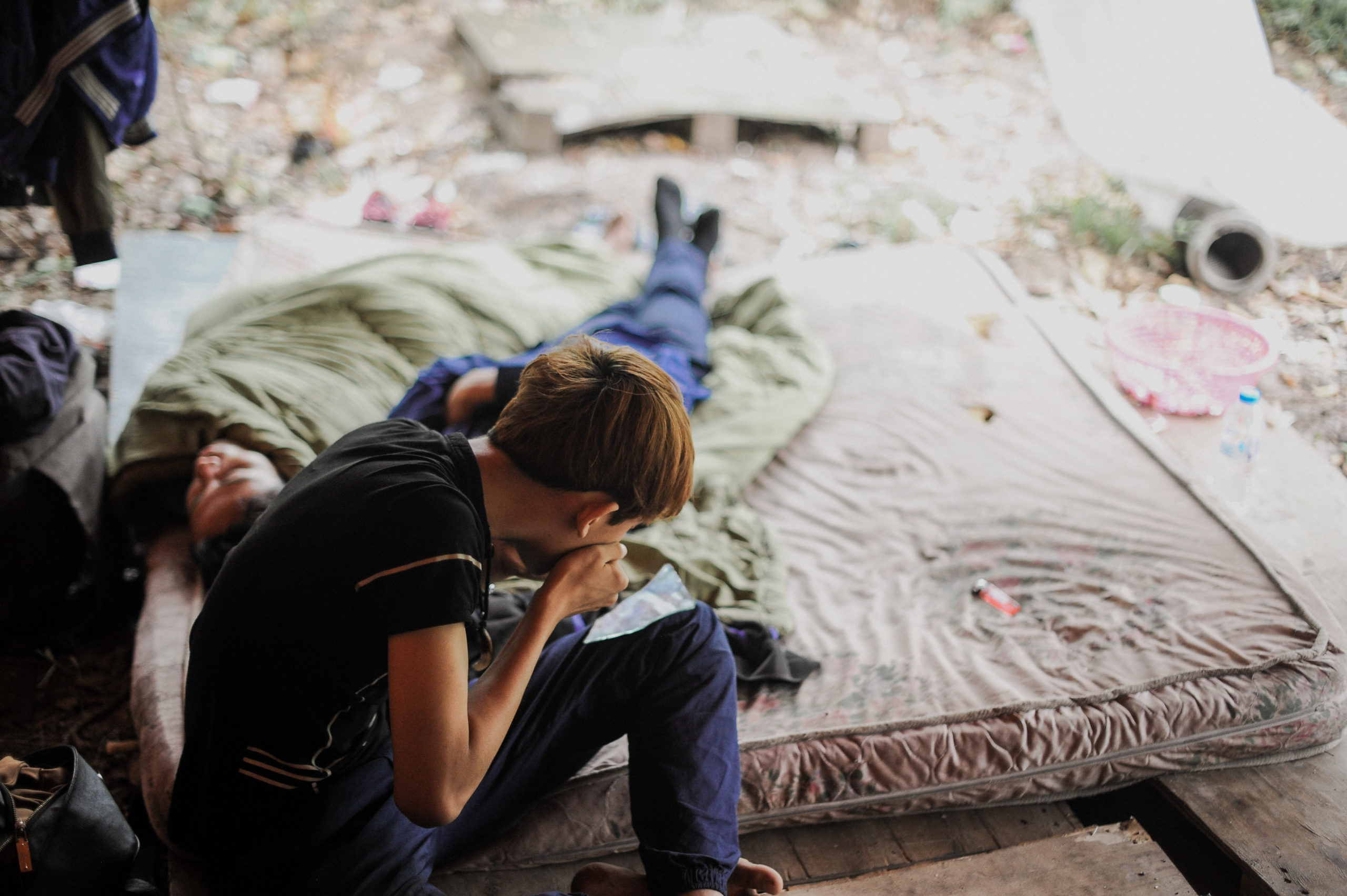
One person told me they hadn’t eaten in three days … They subsist on the food from charities, but this stopped due to the lockdown
Ba had been homeless before the onset of Covid-19, but now the chronically poor such as herself are finding themselves in new company and with fewer resources to go around. During the first lockdown in Hanoi, HHH saw unfamiliar faces among more people than ever looking for food and help.
In bitter irony, during a lockdown initiated to protect the public from the novel coronavirus, Axe said the health and well-being of the homeless can “decrease dramatically” as they’re blocked from accessing the aid they need to survive.
“One person told me they hadn’t eaten in three days,” Axe said. “They subsist on the food from charities, but this stopped due to the lockdown.”
As the active case counts of Covid-19 tick upward, he and many others in the capital are looking on with apprehension. For the city’s homeless with nowhere else to go, an ounce of prevention may prove lethal treatment.
“There was a point during the previous lockdown that I thought, if this continues, we’re going to get people dropping dead in the street,” Axe said. “We’re going to see people starving to death.”


